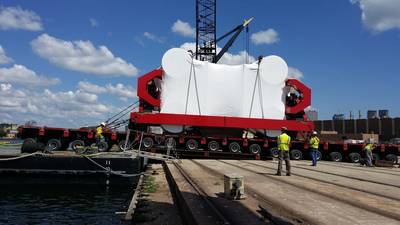“We are about half-way through the 2016 navigation season and our overall cargo tonnage numbers are down by 11 percent,” said Betty Sutton, Administrator of the Saint Lawrence Seaway Development Corporation. “The lack of iron ore and coal has definitely been a contributing factor for this decrease; however international traffic continues to be well above the five-year average, keeping our ports and their workforce busy.”
Sutton added, “Aluminum shipments supporting the automotive industry played a significant role in activity at the ports of Oswego, NY, Toledo, OH and Detroit, MI. We also saw wind energy parts moving through the Port of Ogdensburg, NY, headed for the new Jericho Rise Wind Farm project in upstate New York. The ports of Chicago, IL, Burns Harbor, IN and Milwaukee, WI were also busy with the movement of steel products and machinery. In addition, agricultural products including soybeans, corn and wheat were loaded in Duluth, MN, Burns Harbor and Toledo, with containerized cargo and general cargo exports leaving from Cleveland.”
“Emmert International, a specialist in designing, engineering, and manufacturing the heavy-haul and rigging equipment used to perform many of the most massive and complex projects in the world chose the Port of Milwaukee to move an extraordinarily large piece of cargo in July,” said Jeff Fleming, Port spokesperson. Emmert arranged for the transportation of a 650,000 pound ‘platen’ to be moved from Canada on a deck barge through the Seaway System to Milwaukee. The platen then headed to Scot Forge in Spring Grove, Illinois via CP Rail which switches into the Port. Emmert relied on the Port’s heavy lift dock capability and their intermodal assets to serve their customer.
“Despite some slowness in the market to start the season, the Port of Cleveland has seen steady growth in our month to month tonnage numbers thus far in the 2016 season,” said David S. Gutheil, Vice President, Maritime and Logistics. “We continue to see steady volumes on imported steel from Europe, while consistently bringing on new customers via the Cleveland-Europe Express, particularly in the container segment. We are also seeing increased interest in the project cargo market, through additional inquiries from customers seeking to move their cargo via the St. Lawrence Seaway and avoid congestion at coastal ports. In July, we completed construction of a new 21,000 square foot warehouse. This new facility, partially funded through a grant secured through the Ohio Department of Development Logistics program, will be used for trans-load opportunities and increases our inside storage capacity to 320,000 square feet.”
The St. Lawrence Seaway reported that year-to-date cargo shipments for the period March 21 to July 31 were 13.2 million metric tons, down 11 percent over the same period in 2015. The dry bulk category was down 13.4 percent but stone and potash were in the positive column at 52 and 17 percent respectively. Iron ore was down 28 percent; coal was down almost 13 percent. While the general cargo category was down 11 percent overall, steel slabs were up 214 percent and other general cargo was up 74 percent.












